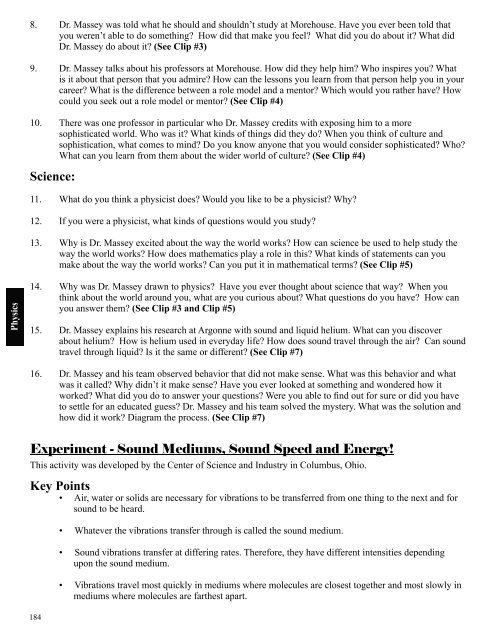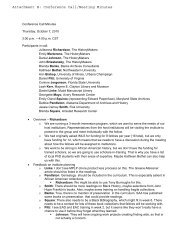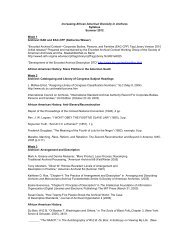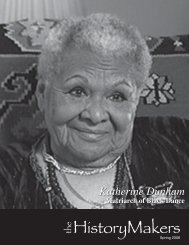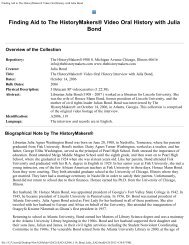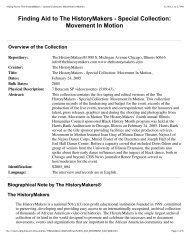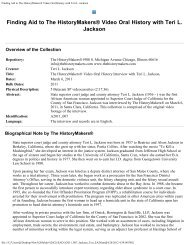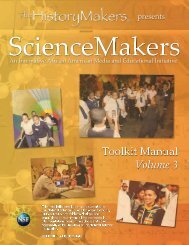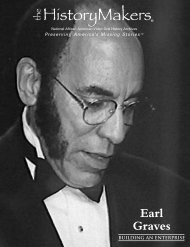ScienceMakers Toolkit Manual - The History Makers
ScienceMakers Toolkit Manual - The History Makers
ScienceMakers Toolkit Manual - The History Makers
Create successful ePaper yourself
Turn your PDF publications into a flip-book with our unique Google optimized e-Paper software.
Physics<br />
8. Dr. Massey was told what he should and shouldn’t study at Morehouse. Have you ever been told that<br />
you weren’t able to do something? How did that make you feel? What did you do about it? What did<br />
Dr. Massey do about it? (See Clip #3)<br />
9. Dr. Massey talks about his professors at Morehouse. How did they help him? Who inspires you? What<br />
is it about that person that you admire? How can the lessons you learn from that person help you in your<br />
career? What is the difference between a role model and a mentor? Which would you rather have? How<br />
could you seek out a role model or mentor? (See Clip #4)<br />
10. <strong>The</strong>re was one professor in particular who Dr. Massey credits with exposing him to a more<br />
sophisticated world. Who was it? What kinds of things did they do? When you think of culture and<br />
sophistication, what comes to mind? Do you know anyone that you would consider sophisticated? Who?<br />
What can you learn from them about the wider world of culture? (See Clip #4)<br />
Science:<br />
11. What do you think a physicist does? Would you like to be a physicist? Why?<br />
12. If you were a physicist, what kinds of questions would you study?<br />
13. Why is Dr. Massey excited about the way the world works? How can science be used to help study the<br />
way the world works? How does mathematics play a role in this? What kinds of statements can you<br />
make about the way the world works? Can you put it in mathematical terms? (See Clip #5)<br />
14. Why was Dr. Massey drawn to physics? Have you ever thought about science that way? When you<br />
think about the world around you, what are you curious about? What questions do you have? How can<br />
you answer them? (See Clip #3 and Clip #5)<br />
15. Dr. Massey explains his research at Argonne with sound and liquid helium. What can you discover<br />
about helium? How is helium used in everyday life? How does sound travel through the air? Can sound<br />
travel through liquid? Is it the same or different? (See Clip #7)<br />
16. Dr. Massey and his team observed behavior that did not make sense. What was this behavior and what<br />
was it called? Why didn’t it make sense? Have you ever looked at something and wondered how it<br />
worked? What did you do to answer your questions? Were you able to fi nd out for sure or did you have<br />
to settle for an educated guess? Dr. Massey and his team solved the mystery. What was the solution and<br />
how did it work? Diagram the process. (See Clip #7)<br />
Experiment - Sound Mediums, Sound Speed and Energy!<br />
This activity was developed by the Center of Science and Industry in Columbus, Ohio.<br />
Key Points<br />
• Air, water or solids are necessary for vibrations to be transferred from one thing to the next and for<br />
sound to be heard.<br />
184<br />
• Whatever the vibrations transfer through is called the sound medium.<br />
• Sound vibrations transfer at differing rates. <strong>The</strong>refore, they have different intensities depending<br />
upon the sound medium.<br />
• Vibrations travel most quickly in mediums where molecules are closest together and most slowly in<br />
mediums where molecules are farthest apart.


